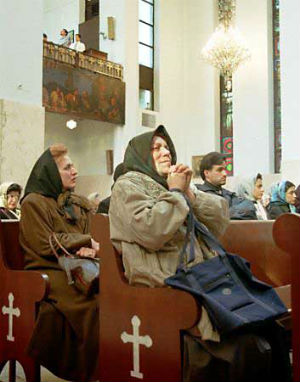
LOS ANGELES, CA (Catholic Online) - The four men in question were arrested last December while they celebrated at a house church. Converting from Islam to Christianity in Iran can be punishable by death.
According to a new U.N. report by Ahmed Shaheed, U.N. special rapporteur on human rights in Iran, such persecution is common in spite of the new Iranian President Hasan Rouhani's pledge for moderation.
"At least 20 Christians were in custody in July 2013," Shaheed wrote. "In addition, violations of the rights of Christians, particularly those belonging to evangelical Protestant groups, many of whom are converts, who proselytize to and serve Iranian Christians of Muslim background, continue to be reported." Halting the spread of Christianity is a cornerstone of Iran's crackdown on religious freedom. There are estimated to be 370,000 Christians in Iran. According to the most recent U.S. State Department report, the clerical rulers see Christianity as a threat to Iran's majority ultra-orthodox Shiite Islamic religion.
"Despite the recent Iranian charm offensive, Dr. Shaheed's report reminds us of the true nature of the Iranian regime where the abuse of human rights continue," Senator Mark Kirk (R-Ill.), chairman and founder of the Iran Dissident Awareness Program, says."Political prisoners like blogger Mohammad Reza Pourshajari are being denied adequate medical care,journalists and their families continue to be targets of the regime, Pastor Saeed Abedini and Amir Hekmati are still languishing in prison and the Baha'i community faces increasing persecution. This is the true nature of the regime we're dealing with during negotiations in Geneva."
A spokesman for Iran's mission to the U.N. Alireza Miryousefi did not respond to requests for comment. The Iranian government blasted Dr. Shaheed's report as not objective.
According to Iran's state-controlled news outlet Press TV, an Iranian official from the U.N. mission said Shaheed "has not paid sufficient notice to Iran's legal system and Islamic culture and considers whatever he sees in the West as an international standard for the entire world."
Shaheed is widely considered to be one of the world's leading authorities on human rights.